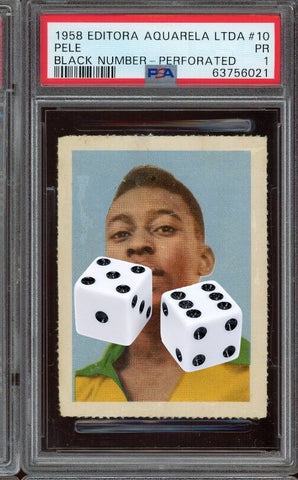
Why Paying for Sports Card Grading Could Be a Sucker’s Game
, by David Riska, 5 min reading time
We DONATE 3% of all Online Sales to Junior Achievement USA

, by David Riska, 5 min reading time
Let’s cut to the chase: is the sports card grading industry a racket, wrapped in a mystery, inside a cash grab. Are enthusiasts, collectors, and naive newcomers getting hoodwinked into shelling out significant sums of money under the guise of ensuring their collections' “value” and “authenticity”. So the ultimate question is sports card grading genuinely worth the investment? Or is it just another elaborate scheme to pry money from your wallet? Let’s break down this potentially overhyped, overpriced phenomenon.
Firstly, the cost. Oh, the costs! Depending on the company and the service level, grading a single card can run you anywhere from $20 to over $300. The price fluctuates based on the card’s estimated value, the turnaround time you expect, and the grading company's current backlog. Yes, that’s right—you’re paying not just for the service, but also based on how much your card might be worth. The various companies argue this is because higher-value cards require more insurance and security during the grading process. Sounds reasonable? Perhaps until you realize that your card's grade itself can be a roll of the dice.

Ah, the grading process—the heart of the beast. It’s mostly still subjective, folks. Despite what these companies want you to believe, grading isn’t purely scientific or consistent. One grader might give your pristine 1986 Michael Jordan rookie card a near-perfect score, and another might dock a point for something as trivial as a microscopic edge imperfection, visible only under intense scrutiny. And here’s the kicker: a difference of even half a point can mean thousands of dollars in market value. It's the epitome of inconsistency wrapped in a cloak of faux precision.
Now, let’s talk about the perceived increase in value. Graded cards are often touted to sell for significantly more than their ungraded counterparts, and yes, there’s some truth to this. For high-end cards, a high grade from a reputable grading service can indeed inflate the selling price. However, consider the average collector—most aren't dealing with ultra-rare cards. Once you factor in the grading costs, are you really seeing a return on investment? For many, the answer is a resounding no. You might end up spending $100 to grade a card that, yes, goes from being worth $50 to $150—if you’re lucky. But subtract your grading fee, and congratulations, you’ve broken even (best case) or lost money (more likely).
The allure of higher resale value also pushes collectors to send in bulk submissions, hoping to hit a few grading home runs. This leads to another issue: turnaround times. Some collectors have reported waiting months, or even over a year, to get their cards back. During this time, market trends shift, and what was a hot card when you sent it off might have cooled down by the time you get it back, graded and all. So much for that investment.
The grading companies aren’t just sitting on their laurels, raking in your cash. In general, they’re also busy pushing the narrative that graded cards are easier to sell, trade, and insure because their condition is certified. Sure, a graded card might be easier to list and sell on an auction site—buyers like seeing that grade. But let’s not forget, every time you engage in these transactions, the platforms take a cut too. Your $300 card at a 10% seller fee suddenly might net you a lot less than anticipated.
Statistics on graded card sales show a skewed market where only the top-tier grades and cards get the attention and dollars they promise. For instance, a PSA 10 graded rookie card of a famous athlete might fetch thousands, but drop down to a PSA 8, and the price plummets. How many PSA 10s are out there? Not many. The odds are not in your favor.
In conclusion, unless you’re dealing in the crème de la crème of sports cards, grading is often more about gambling than guaranteeing any real value. It can be an expensive process that promises more than it delivers for most. If you enjoy collecting, do it for love, not because you think it's going to pay off your mortgage. Don't just get sucked into the card grading game—it could be a play to line the pockets of those running the show, not yours.


